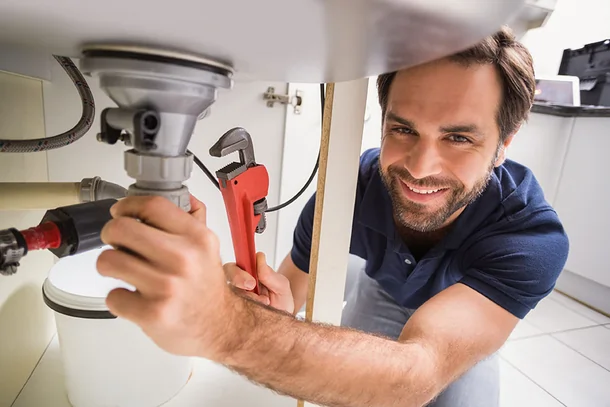Plumbing FAQs
Plumbing can be puzzling for many of us, whether we own or rent our Minneapolis, MN homes. From addressing leaky faucets and clogged drains to understanding water heater maintenance and pipe materials, plumbing conundrums are a common occurrence.
The experts from Mr Plumbing and Drains are here to delve into some plumbing FAQs, helping you learn how to keep your plumbing running smoothly and avoid common problems.
- Q: Why is my faucet dripping?
A: A dripping faucet is often caused by a worn-out or damaged internal component, such as the rubber washer or O-ring. Over time, these parts can degrade due to constant use, causing water to leak through even when the faucet is turned off. Replacing the faulty component with a new one is usually a straightforward solution to stop the drip and save water. If you’re not comfortable with DIY repairs, a plumber can quickly address the issue and prevent further water wastage. - Q: How do I unclog a toilet?
A: To unclog a toilet, start by using a plunger. Make sure there’s enough water in the bowl to cover the rubber part of the plunger. Place the plunger over the drain hole and push down firmly, then pull up quickly. Repeat this motion several times to create pressure and dislodge the clog. If the plunger doesn’t work, consider using a toilet auger, which is a specialized tool designed to break up tougher clogs. Avoid using chemical drain cleaners, as they can damage your toilet and plumbing system. - Q: What causes low water pressure?
A: Low water pressure can stem from various factors, including mineral buildup in pipes, partially closed water valves, leaks in the plumbing system, or even issues with the municipal water supply. Accumulated sediment and scale within pipes can restrict water flow, while partially closed valves limit the amount of water reaching your fixtures. Identifying the specific cause of low water pressure is essential for effectively addressing the issue. A professional plumber can diagnose and repair the low water pressure issue in your home. - Q: Why is my water heater not producing hot water?
A: If your water heater is not producing hot water, several factors could be at play. The pilot light might be out in gas-powered heaters, or the heating element could be faulty in electric ones. Additionally, a malfunctioning thermostat or sediment buildup within the tank could be affecting the heating efficiency. If troubleshooting the pilot light and thermostat doesn’t solve the issue, it’s advisable to contact a professional plumber to diagnose and repair the problem, as working with water heaters involves potential hazards. - Q: What should I do about a running toilet?
A: If you have a running toilet, it’s likely caused by a faulty flapper or a problem with the fill valve. Open the toilet tank and check if the flapper is properly sealing the flush valve. If it’s warped or damaged, replacing it can often solve the issue. If the flapper seems fine, check the fill valve and adjust the water level if needed. If these DIY fixes don’t work, or if you’re unsure, consider contacting a plumber to diagnose and resolve the problem. A running toilet can waste a significant amount of water over time, so addressing it promptly is important. - Q: How can I prevent frozen pipes in winter?
A: To prevent frozen pipes during winter, insulate exposed pipes in unheated areas with pipe insulation or heat tape. Let faucets drip slightly during extreme cold to relieve pressure and prevent freezing. Maintain a consistent indoor temperature, even when you’re away, and consider using a smart thermostat to remotely monitor and adjust temperatures. Lastly, disconnect and drain outdoor hoses before winter, and close outdoor water supply valves to prevent water from reaching the exposed pipes. Professional plumbing maintenance services can help ensure your home’s plumbing system is prepared for the harsh Minnesota winters. - Q: What’s causing my drain to smell bad?
A: A bad smell coming from your drain is often caused by organic matter, such as food particles, grease, or hair, getting trapped and decomposing in the pipes. Over time, this decomposition can create foul odors. Regularly flushing your drains with hot water and baking soda can help prevent buildup and odors. If the smell persists, there might be a more significant blockage or issue that requires professional attention. - Q: Can I fix a leaky pipe myself?
A: If the leak is minor and you’re comfortable with basic DIY tasks, you might be able to fix a leaky pipe yourself. Start by turning off the water supply to the affected area. Then, clean and dry the pipe around the leak. Depending on the location and type of pipe, you can use solutions like pipe tape or epoxy putty to seal the leak temporarily. However, for major leaks or if you’re unsure, it’s advisable to call a professional plumber to prevent further damage or potential safety risks. - Q: How often should I flush my water heater?
A: It’s recommended to flush your water heater at least once a year to prevent sediment buildup. Sediment accumulation can reduce the efficiency of your heater and lead to potential issues. Flushing involves draining a few gallons of water from the tank to remove sediment and debris. Contact your local professional plumber to learn more about flushing your water heater. - Q: What’s the best way to clean a garbage disposal?
A: The best way to clean a garbage disposal is by using a combination of ice cubes and citrus peels. Simply toss a handful of ice cubes and some citrus peels (such as from lemons, oranges, or limes) into the disposal. Turn on the cold water and then the disposal for a few seconds to grind up the ice and peel. The ice helps remove debris and buildup from the grinding components, while the citrus peels add a pleasant scent. Avoid using harsh chemicals, as they can damage the disposal and be harmful to the environment. Be sure to contact a professional if your garbage disposal is still clogged or malfunctioning. - Q: Why is my sink draining slowly?
A: A slowly draining sink is often caused by a buildup of debris, such as hair, soap scum, or food particles, in the drain pipe or P-trap. These accumulations can restrict the flow of water, leading to slow drainage. Using a plunger or a drain snake to dislodge the clog is a good first step. If the issue persists, removing and cleaning the P-trap or seeking professional assistance might be necessary to fully resolve the problem and restore proper drainage. - Q: What’s the difference between hard water and soft water?
A: Hard water contains minerals like calcium and magnesium, which it picks up from the ground as it travels through rocks and soil. Soft water, on the other hand, has had those minerals removed, usually through a process called ion exchange. Hard water can leave mineral deposits on faucets and dishes, while soft water can feel slippery and might require less soap for cleaning. - Q: How do I fix a leaky shower head?
A: To fix a leaky shower head, start by turning off the water supply to the shower. Then, carefully remove the shower head using a wrench and a cloth to protect the finish. Inspect the threads for any damage or debris that might be causing the leak. If the threads are damaged, you might need to replace the shower head or the washer inside. Apply plumber’s tape to the threads before reattaching the shower head, ensuring a tight seal. Turn the water supply back on and test the shower to see if the leak is resolved. If the issue persists, consider replacing the shower head or seeking professional assistance. - Q: What’s causing a gurgling sound in my drains?
A: A gurgling sound in your drains often indicates a problem with improper venting or a partial blockage in your plumbing system. When water flows down a drain, it creates a vacuum behind it that’s normally filled with air from the vent pipes. If these vent pipes are blocked or not functioning correctly, air struggles to enter the pipes, leading to the gurgling noise. Additionally, a partial blockage in the drain itself can cause air and water to mix, producing the gurgling sound. If you’re experiencing persistent gurgling, it’s a good idea to have a professional plumber inspect your plumbing system to identify and resolve the underlying issue. - Q: Can I use chemical drain cleaners?
A: Using chemical drain cleaners is generally not recommended. These harsh chemicals can damage your pipes over time and are harmful to the environment. They might provide a temporary fix for clogs, but they often don’t completely clear the blockage and can even make the situation worse if they get trapped in the pipes. Opt for mechanical methods like a plunger or a drain snake, or consider natural solutions like a mixture of baking soda and vinegar to safely and effectively clear clogs without harming your plumbing. If you’re dealing with a persistent clog, it’s best to consult a professional plumber for a thorough and long-lasting solution. - Q: What’s causing my water to have a strange taste or odor?
A: Strange tastes or odors in your water can be attributed to various factors such as bacteria or chemicals in your water source. If your water tastes or smells significantly off, it’s advisable to contact a plumber to ensure dirty or rotting pipes aren’t the culprit. Additionally, they can install a water filter that can help address minor taste and odor concerns. - Q: How do I find a hidden water leak?
A: To find a hidden water leak, start by turning off all water sources in your home and monitor your water meter for movement. If the meter continues to register water usage, you likely have a leak. Check for damp spots, water stains, or mold growth around walls, ceilings, and floors. You can also listen for the sound of running water when no faucets are on. If you’re unsure or the leak is hard to locate, it’s wise to consult a professional plumber who can use specialized tools to pinpoint and fix the issue. - Q: Can I replace a single pipe in my plumbing system?
A: Yes, you can replace a single pipe in your plumbing system, but it might involve cutting and soldering. If you have the necessary plumbing skills and tools, you could attempt this as a DIY project. However, keep in mind that working with plumbing systems requires precision, and any mistakes could lead to leaks or further damage. If you’re uncertain or uncomfortable with the process, it’s advisable to consult a professional plumber to ensure the replacement is done correctly and safely. - Q: Why is my bathtub not draining properly?
A: A bathtub that isn’t draining properly is often the result of a clog in the drain caused by a buildup of hair, soap scum, and debris. Over time, these materials can accumulate and block the water flow. Using a drain snake or removing the stopper to physically remove the clog can often solve the issue. Additionally, regular maintenance, like using drain covers to catch hair and periodically cleaning the drain, can help prevent future clogs and keep your bathtub draining smoothly. If the problem persists, it might be necessary to consult a professional plumber to ensure the issue is properly resolved. - Q: How can I prevent a sewer line backup?
A: Preventing a sewer line backup involves mindful practices to avoid blockages and maintain the health of your plumbing system. Refrain from flushing non-biodegradable items, like wipes and hygiene products, down the toilet. Use drain strainers to catch hair and debris in sinks and showers. Regularly clean your drains and pipes using natural solutions or enzymatic cleaners to prevent buildup. Additionally, consider scheduling periodic professional inspections and cleanings to ensure the sewer line is properly functioning and for early detection of potential issues.
Contact Mr Plumbing and Drains For Expert Solutions To Plumbing FAQs in Minnesota, MN
If you’re experiencing any issues with your plumbing system, it’s best to call a professional you can rely on to solve the problem. For reliable and expert plumbing solutions in Minnesota, MN, don’t hesitate to reach out to Mr. Plumbing and Drains.
Our team of professionals is ready to assist you with a wide range of plumbing needs, from repairs to installations. Contact us today for prompt and effective plumbing services that you can trust. Your satisfaction is our priority.
WHY MR PLUMBING AND DRAINS?






